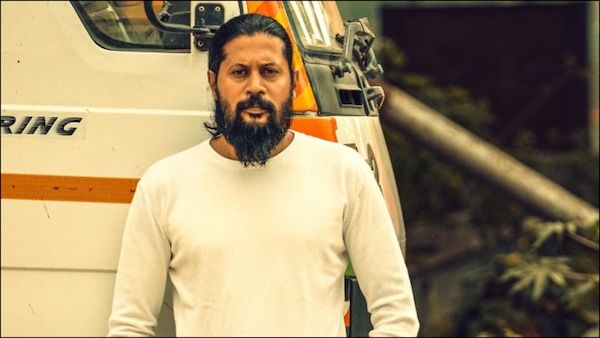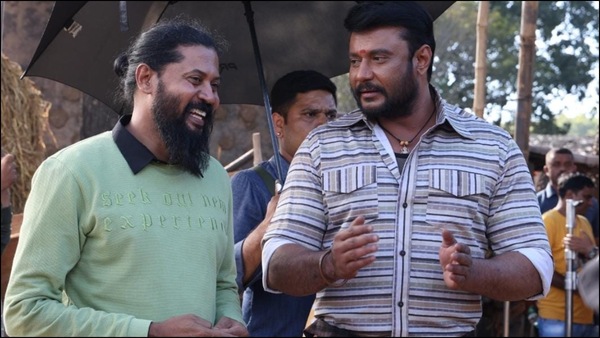Exclusive | Maasthi Upparahalli on Kaatera, writing lines for the Challenging Star Darshan and more
Maasthi Upparahalli has been a familiar presence of late in Kannada cinema. OTTplay caught up with the dialogue writer about his latest gig 'Kaatera', for which he has been receiving a lot of praise.

Last Updated: 03.59 PM, Jan 05, 2024
Over the past few years, Maasthi Upparahalli has been a familiar presence in Kannada cinema as someone who has his way with words. As a sought-after dialogue writer in the mainstream space, Maasthi has worked on several noteworthy titles such as 'Tagaru', 'Ayogya', 'Salaga', 'Hondisi Bareyari', and 'Ghost', among others.
However, it's his work on Tharun Kishore Sudhir's latest film 'Kaatera' that has got everyone talking. Handling the mighty task of penning lines for Challenging Star Darshan and also juggling the objective of doing justice to the poignant subject of the film, Maasthi churned out a vocabulary that's "punchy", rhythmic and conversational, all at once, for the film. In fact, many have walked out of the cinema hall recalling the dialogues or one-liners of 'Kaatera' and have regarded them as one of the main highlights of the film.
OTTplay caught up with the artist who generally operates from under the radar but has his presence felt nevertheless. Here are edited excerpts from the conversation with Maasthi Upparahalli:
What was the toughest aspect of writing dialogues for 'Kaatera'?
On the one hand, it was writing lines for Darshan sir who carries such a powerful image. At the same time, I had to make sure that the story written by Tharun Sudhir sir and Jadesh (K. Hampi) sir, which is set in the 1970s, was well captured in the dialogues. So, the challenge was to balance Darshan sir's persona as a star with the authenticity of the story.
Also Read: Kaatera review - Challenging Star Darshan is solid, effective in Tharun Sudhir's well-meaning film
How did the collaboration with director Tharun Sudhir fare?
It all starts with a narration of the script, which gives me an idea of what the film is about, the period it is set, the tone of the film, etc. The actual work begins when Tharun and Jadesh sir hand me the bound script which has all the scenes, a brief description of each of them, etc. but not the dialogues. I use those inputs to pen my lines, add context and build the scene as per the requirement. Of course, it is a back-and-forth process because my work is based on constant discussion with the screenwriter(s) and the director.
Once I take my initial draft to them, a few changes emerge, a few references are suggested to me and the scenes go through more changes. Alongside, I have my own research into the topics that the film is dealing with - in this case, I read quite a few papers related to the Land Reform Act and other technical points.

I am guessing 'Kaatera' proved to be particularly difficult for you...
Yes, as I pointed out, you have to do justice to both the image of the star and also the subject, which is very sensitive. And unlike most of my other projects, I took more time for this one because Tharun sir and I wanted to get it right. Especially since we were dealing with subjects like casteism.
That said, we made sure that we weren't blindly dedicating all the dialogues to the hero or the villain. The conscious effort was to make sure that every character has equal "weightage" in this aspect - if Darshan gets a chunk of the space, so does the other important character in that scene. Everybody has to have a say, be it Avinash sir's character or Aradhana Ram's Prabhavathi.
In the same vein, we made sure that the hero of the film is not built up by every character, but only by a select few characters. You won't see anyone close to Kaatera praising or flattering him. It's only the villains like Jagapathi Babu sir or Vinod Kumar Alva sir who speak of him in the third person.
Can you tell me how you went about handling the sensitive subjects in the film?
I decided to follow three main "threads" in the narrative - if you have watched 'Kaatera', you will know that the film is about three important subjects. One of them is the caste-based oppression that the farmers endure in the film, the second being the Land Reform Amendment Act and the third is Darshan sir's image as a star.
My job here was to make sure that each of the three topics is addressed in the right manner through dialogues and also that the story moves forward. Also, one must remember that as the dialogue writer, I cannot completely change the make-up or structure of a scene but only bend it a little, and that too with proper justification. So, as I said, I must add context and depth to the scene that already exists and use everything around me - the situation, the props, the conflicts, etc. - to write the lines.
What makes 'Kaatera' special in your books?
Someone pointed out to me recently that another highlight of 'Kaatera' is the manner in which the properties or the "props" in the film are used. I suppose that's exactly what makes this film a unique one.
The props came in incredibly handy for us to make certain delicate points through metaphors - for instance, the scene in which Prabhavathi and her father (played by Avinash sir) talk about caste and hierarchy in society. The use of slippers helped me accentuate that particular scenario and use a visual element to make the point. Similarly, the scene in which the little boy is reprimanded for using the owner's tumbler for drinking water. Or the one involving the steel machete - Darshan sir says in the scene that a weapon must have ahankara (arrogance) and not alankara (vanity).
How important is it for a dialogue writer to have a grip on the backdrop of the story?
It is definitely a big task but in the case of 'Kaatera', I wrote the dialogues in a neutral Bengaluru or Mysuru dialect. Since I don't belong to the region that the film is set in, nor am I an expert in the specific rural, 1970s backdrop. So, I recommended that Tharun sir brings another very skilful dialogue writer B.A. Madhu on-board for the job. Madhu sir has worked on several films in the '90s and 2000s and is extremely familiar with the territory 'Kaatera' is part of - he was able to make the necessary changes and imbue the dialogues with the quintessence of the region.

